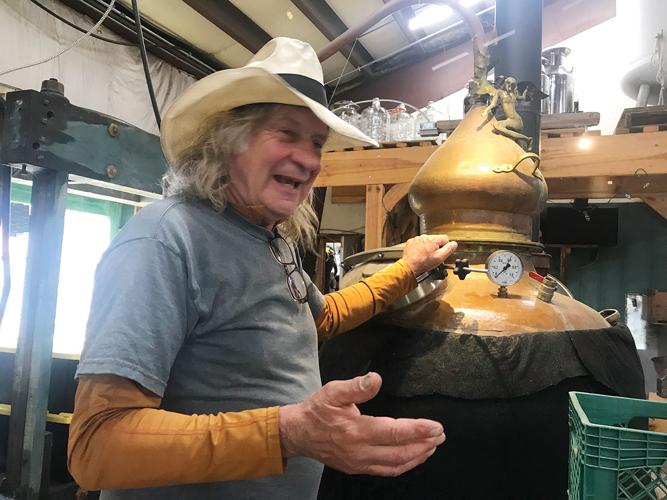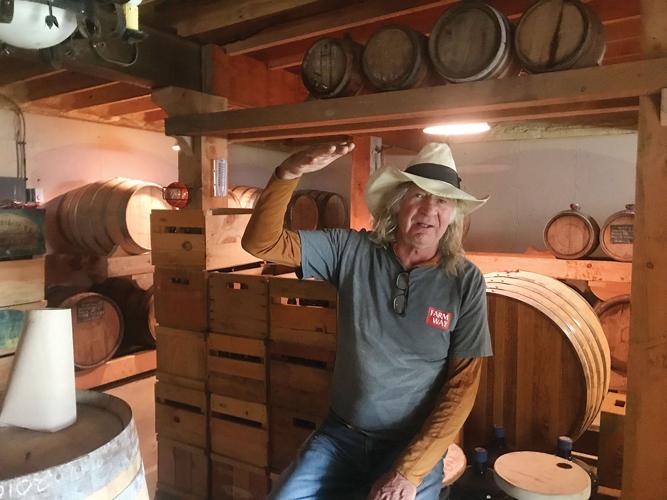Cider doughnuts paired with sweet apple cider are generally a welcome snack after apple picking at Shelburne Orchards. This year, those 21 and over can pair a different beverage with their doughnuts.
The orchard’s brandy tasting room has finally opened after acquiring permits to distill the liquor in 2009, and the brandy has properly aged to perfection.
“It’s a nice post-Thanksgiving beverage — it warms you up,” Caitlin Cocina, of Shelburne, said as she tasted the liquor last Thursday afternoon.
“Pair this with pumpkin pie, or cider doughnuts,” she mused as her eyes lit up while the scent of the doughnuts being made in the next room wafted through the air.
Michael Parker, of Barre, has been coming to the orchard since he was a child, but it’s “way different,” he said now that apple brandy is available at the orchard.
Tasters used words like “smooth” and “sweet” to describe Dead Bird Brandy, poured in quarter-ounce tastes. The spirit has a bite that quickly turns sweet after sipping it.
“That was very, very good,” Carla Contreras, of Charlotte, said. “And I don’t drink dark stuff ever.”
Then they tried the Pommeau — a hard apple cider infused with brandy. The lighter liquor is sweeter, and tastes closer to sweet apple cider.
Brandy is typically made from grapes, but it can be made from any fructose sugar, such as that found in apples. The brandy was as much a passion project for Nicholas Cowles as a business venture to keep his family business afloat. Cowles grew up on the farm his father bought in 1950s. Now, as the owner, Cowles wants to preserve the orchard for his children.
‘The true spirit of Vermont’
While the craft spirits industry has taken off in Vermont in recent years, not many distillers themselves grow the ingredients that go into their liquors.
There are 28 spirit manufacturers in Vermont, according to the Vermont Department of Liquor and Lottery, many who use Vermont-sourced ingredients for their liquors. A few of those distillers, including Shelburne Orchards grow their own ingredients on family farms.
Flag Hill Farm in Vershire was the first Vermont farm to produce brandy legally when they acquired their liquor license in 2000, owner and distiller Sebastian Lousada said. Hell’s Gate Distillery in Georgia, Vt. started making a variety of black currant liquors in 2015, including a brandy, from currants grown on the family farm, according to its website.
Boyden Valley Winery in Cambridge makes a variety of brandy-based liqueurs that use Vermont apples. The winery’s apples are sourced from the Brown Family Farm in Castleton, said general manager Bridget Jones.
At Shelburne Orchards, the apple brandy is produced on the farm from branch to bottle. Cowles calls it “the true spirit of Vermont.”
More than 30 farm-grown varieties of apples and crabapples make their way into the brandy. The apples for brandy, unlike apples for the fresh sweet cider, can be apples that have dropped off trees, Moriah Cowles said. That works to the farm’s advantage this year because the drought has made smaller apples, which drop quickly, she said.
The fruit is pressed, then fermented into hard cider — about 6 percent alcohol — and finally distilled into a liquor.
The liquor is then aged in oak barrels underground in what Cowles has dubbed “the ultimate man cave.”
Steps away from the tasting room, built into the side of a hill is the inconspicuous barrelhouse. The concrete structure was built a few years ago to store the barrels that previously were stored in the cellar of the farmhouse where the cider doughnuts are fried, as the fryers posed a fire hazard.
Today, dozens of barrels of brandy years in the making sit in the barrelhouse, aging slowly. Each barrel contains enough brandy for 215 bottles. The aroma in the room is strong as the liquor evaporates from the brandy, creating the thicker, darker brandy that eventually is bottled.
Cowles estimates that about 77 apples go into a bottle of brandy.
The orchard’s Dead Bird Brandy is aged for about seven years in oak barrels. The Pommeau is barrel-aged for three years.
Keeping the family orchard
“It’s been a struggle to keep (the orchard) in the family,” Cowles said. “I had to be creative all along to keep it thriving as a business.”
In order to make the most money from his crop, Cowles decided to sell apples directly from Shelburne Orchards instead of packaging and selling them at local grocery stores.
Over the years Cowles has organized festivals to bring people to the orchard, but there were still excess apples. Now distilling and bottling brandy, the farm uses more than 90 percent of the fruit produced by its nearly 6,000 apple trees, Cowles said. The product is also a type of insurance against the growing threat from new weather patterns.
“Being a farm, crazy weather patterns can ruin a year’s crop,” he said. “Having a product we make that spans all of these years is a hedge against the crazy weather patterns.”
Cowles has been distilling brandy from the orchard’s apples as a hobby since he was a teenager. Now that it’s a full-fledged part of the business, he takes it more seriously.
“Every morning when I get up I’m freaking stoked,” Cowles said. “My father always had a barrel of hard cider in the cellar, and my grandfather had a still during prohibition.”
So, distilling is in Cowles’ blood.
Cowles also is thinking ahead to future generations. His 9-year-old grandson, also named Nicholas, has a special barrel of brandy awaiting his 21st birthday that will be cracked open in 2030.
Cowles is also planting new heirloom apples each year to add to future batches of brandy. He knows there won’t be enough apples from new trees to affect the brandy’s composition for about the next 10 years, and then it will take another seven years to age. He makes the crop adjustments for future generations.
Cowles, now 68, says his daughter Moriah will be taking over the farm in a few years.
His next adventure? Pear brandy.
Cowles says he’s reading up on it and working on a recipe — something that evolves after many attempts, he explained. It’s just like how he tinkers with the apple brandy recipe year to year.
“I’m not doing this for instant gratification,” Cowles said. “This is going to be for the next generation.”
The tasting room at Shelburne Orchards, 216 Orchard Road, is the only place to buy Dead Bird Brandy. It’s open 11 a.m. to 5 p.m. on weekends, and by appointment on weekdays.


















(0) comments
Welcome to the discussion.
Log In
Keep it clean. Please avoid obscene, vulgar, lewd, racist or sexual language.
PLEASE TURN OFF YOUR CAPS LOCK.
Don't threaten. Threats of harming another person will not be tolerated.
Be truthful. Don't knowingly lie about anyone or anything.
Be nice. No racism, sexism or any sort of -ism that is degrading to another person.
Be proactive. Use the "Report" link on each comment to let us know of abusive posts.
Share with us. We'd love to hear eyewitness accounts, the history behind an article.